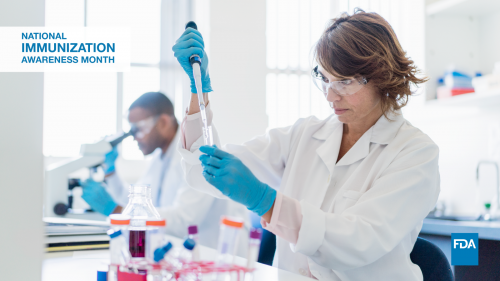Original Post

By: Robert M. Califf, M.D., Commissioner of Food and Drugs
National Immunization Awareness Month provides us an opportunity to think about how far the development and advancement of immunization science has come, and its impact on public health. The U.S. Food and Drug Administration plays a key role in immunization by evaluating vaccines for safety and effectiveness before they are made available to the public.

Vaccines work by stimulating the body’s immune system to safely provide protection against viruses or bacteria that cause infection. After vaccination, the immune system is prepared to respond quickly when the body encounters the disease-causing organism.
Why are vaccines important? They help provide protection from an infectious disease and can lessen the severity of illness. If you are immune to a disease, you can be exposed to it without becoming sick. Simply put, because of advances in medical science, vaccines can help protect us against more diseases than ever before. Some diseases that once injured or killed thousands of people have been eliminated primarily due to vaccines.
As a medical doctor, I know all too well how important vaccinations are throughout life, helping people of all ages live longer, healthier lives. The World Health Organization estimates that immunization currently prevents 3.5-5 million deaths every year from diseases like diphtheria, tetanus, pertussis, influenza and measles and tens of millions of people are alive today because of the COVID-19 vaccines.
Getting the right information about immunization in the digital age, however, can be like drinking from a fire hose. Most Americans are on the receiving end of a constant barrage of information coming at them through phones, laptops, TVs, and social media. Trying to filter fact from fiction can be a challenge, but oh so critical when it comes to public health.
When it comes to immunizations, it’s important to remember three things.
1. FDA Authorizes or Approves Vaccines Based on Rigorous Evaluation and Analysis of Data
Vaccines to prevent infectious diseases are given to millions of babies, children, adolescents and adults, so it is critical that they are demonstrated to be safe and effective. Vaccines undergo a rigorous FDA evaluation of laboratory and clinical data to ensure their safety, effectiveness and manufacturing quality. The FDA’s Center for Biologics Evaluation and Research (CBER) is responsible for regulating vaccines.
2. COVID-19 Vaccines and Flu Vaccines Save Lives
Specific to COVID-19 vaccines, CBER has been integral in overseeing the development of the vaccines to prevent COVID-19 and authorizing and approving the vaccines that are proven to meet criteria for safety and effectiveness. Working with manufacturers in order to get the vaccines to the public as quickly as possible, while adhering to the FDA’s rigorous scientific and regulatory evaluation process, has enabled one of the major achievements in the history of biomedical science. The FDA will only approve or authorize a vaccine for emergency use if it meets the agency’s standards for safety, effectiveness, and manufacturing quality. We have a dedicated group of experienced scientific and medical professionals evaluating the available data to make sound, scientific decisions about these vaccines.
Staying up to date with COVID-19 vaccination is the best way to help protect against severe illness and hospitalization from COVID-19. Even fully vaccinated people may get infected. However, for people who have received both the primary series and a booster dose when eligible, the symptoms are often much less serious. The Centers for Disease Control and Prevention (CDC) considers that you are up to date with your COVID-19 vaccines when you have received all doses in the primary series and all boosters recommended for you, when eligible. COVID-19 mRNA vaccines are highly effective in preventing the most severe forms of COVID-19. Being up to date on COVID-19 vaccination reduces a person’s risk of dying by over 90% – a remarkable effect.
And it’s not too soon to start thinking about influenza (flu) viruses which typically spread in fall and winter. The flu is a contagious respiratory disease that is caused by influenza viruses which infect the respiratory tract (nose, throat, and lungs). The flu is different from a cold because the symptoms and complications can be more severe.
A lot of the illness and death caused by the influenza virus can be prevented by a yearly influenza vaccine, or flu shot. The CDC recommends that most individuals 6 months of age and older get the flu vaccine every year. It is especially important for people in high-risk groups.
3. Be Smart When Considering Your Source of Information
Drinking from a fire hose is rarely a fruitful endeavor and a good filter can be helpful. One of my priorities is to focus on countering the growing dissemination of misinformation and disinformation about science, medicine, and the FDA, which is putting patients and consumers at risk. Increasingly people are being distracted and misled.
The constant stream of information, opinion and, too often, disinformation, has eroded trust in societal institutions, including the FDA – and, regrettably, in the science upon which our decisions are based. This is causing harm to patients and consumers. It greatly concerns me that people are choosing not to receive the COVID-19 vaccines and are falling behind on routine vaccinations.
The FDA is working to promote reliable information and discredit misinformation or disinformation that is intentionally designed to harm people. For accurate information about immunizations, look for information from our U.S. government partners, such as the CDC and your local health authority. It’s ok to have questions about vaccines, so if you do, talk to a health care professional.
Vaccines have prevented countless cases of disease and disability and have saved millions of lives. We are so fortunate that today, because of safe and effective vaccines, few people experience the devastating effects of measles, pertussis and other serious illnesses.
For you and every member of your family, it is important to stay up to date with vaccinations. August is National Immunization Awareness Month, now is a great time to get back on track with routine vaccinations.
For more information:
Vaccine Development 101
National Immunization Awareness Month
Vaccines.gov
